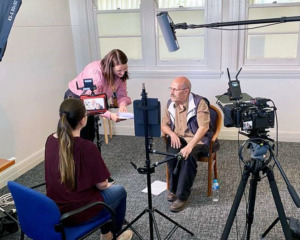
NARI uses assessmentQ for interpreter training in dementia research
The Australian National Ageing Research Institute (NARI) is investigating how specific training can help interpreters better communicate with older people from diverse cultural and linguistic backgrounds during dementia assessments. Both the training and the assessment of the interpreters is undertaken entirely online via assessmentQ.
Interpreters: the bridge between clinicians and dementia patients
To detect dementia, hospitals use cognitive tests – a series of simple questions that examine a person’s mental capacity. In Australia, these cognitive tests have an added dimension, as a large part of the population are what are termed ‘culturally and linguistically diverse’ (CALD). This means that, for many Australians, English is not their first language. Therefore, hospitals use interpreters to facilitate communication between CALD patients and healthcare staff.
 ‘CALD people with dementia tend to first lose the language they learned last. We call this the last in, first out principle.’
‘CALD people with dementia tend to first lose the language they learned last. We call this the last in, first out principle.’
Professor Bianca Brijnath, Divisional Director of Social Gerontology at NARI
Seeing as interpreters often hold little experience in the field of dementia, inconsistencies can occur when interpreting, which can subsequently undermine the validity of cognitive tests. Today, an increasing number of interpreters recognise the need for specialised training to better prepare for such scenarios.
About NARI’s MINDSET study
Australia’s National Ageing Research Institute (NARI) is conducting research into the impact of training on the interaction between interpreters and older CALD people during cognitive tests. MINDSET – as the research is titled – is focused around six languages: Arabic, Cantonese, Greek, Italian, Mandarin and Vietnamese. Also contributing are the National Accreditation Agency for Translators and Interpreters (NAATI), Dementia Australia, various universities, interpreters and medical experts.
 ‘We needed online training‘, says Dr Andrew Gilbert, Research Fellow in NARI’s Social Gerontology division. ‘Interpreters in Australia are often on the road and have little time to undergo on-site training. In addition, we wanted to reach interpreters in the country’s more remote regions.‘
‘We needed online training‘, says Dr Andrew Gilbert, Research Fellow in NARI’s Social Gerontology division. ‘Interpreters in Australia are often on the road and have little time to undergo on-site training. In addition, we wanted to reach interpreters in the country’s more remote regions.‘
‘Some team members had already heard a lot of good things about the online platform assessmentQ, or had already worked with Televic technology in the past. NAATI also uses assessmentQ for its training and assessments.’
‘The assessmentQ interpreter module was the deciding factor, allowing us to simulate cognitive tests via short videos, recording participants’ answers – both audio and video – for subsequent assessment. As some of the first users to test out the new module, we were extremely satisfied. Without the interpreting module, our research wouldn’t be as powerful as it is today.’
 ‘Choosing assessmentQ was a no-brainer, especially with its interpreting module, taking our research to the next level.’
‘Choosing assessmentQ was a no-brainer, especially with its interpreting module, taking our research to the next level.’
Dr Andrew Gilbert, Research Fellow in Social Gerontology at NARI
Highly intuitive
‘The implementation of assessmentQ went very smoothly‘, says Professor Bianca Brijnath, Divisional Director of Social Gerontology at NARI. ‘Televic gave us a walkthrough of the platform and, despite the time difference, was always on hand to provide assistance.’
‘I like to figure things out myself and don’t like calling helplines right away’, Andrew adds, ‘but that wasn’t necessary in this case. The platform is very intuitive. If you do get stuck, you’ll almost always find the answer in the numerous support documents.’
‘assessmentQ is highly intuitive. If you do get stuck, you’ll always find the answer in the numerous support documents.’
Dr Andrew Gilbert, Research Fellow in Social Gerontology at NARI
‘To fine-tune our research, twelve interpreters were given advance access to the training in assessmentQ. I sat by them as they went through everything, meaning they could provide immediate feedback on the exam contents and the way in which it is presented on the platform.’
assessmentQ measures learning improvements
 ‘Now that the pilot phase is completed, we can begin the trial phase’, explains Andrew. This consists of one training course and three assessments. We are recruiting 120 interpreters, 60 of which will undergo the assessmentQ training. The other 60 will make up the control group. We hope to investigate two things: first, whether the interpreters score better after undergoing the training, and second, whether the trained interpreters do better than those who have not undergone the training.’
‘Now that the pilot phase is completed, we can begin the trial phase’, explains Andrew. This consists of one training course and three assessments. We are recruiting 120 interpreters, 60 of which will undergo the assessmentQ training. The other 60 will make up the control group. We hope to investigate two things: first, whether the interpreters score better after undergoing the training, and second, whether the trained interpreters do better than those who have not undergone the training.’
‘Both in the training and the assessments, we opted for a practical approach. The training covers five domains: dementia, cross-cultural communication, (de)briefings and introductions, interpreting strategies, and ethics. We discuss each domain on the basis of different scenarios. Every so often, the participants can test their knowledge with the use of short multiple-choice questions.’
‘To build up the evaluations, we made good use of assessmentQ’s many question types. We integrated different types of multiple choice questions, drag-and-drop questions and of course the interpreting module to simulate all kinds of realistic scenarios.’
‘We didn’t want to develop a traditional training course filled with lots of theory, rather one developed from a more practical perspective.’
Dr Andrew Gilbert, Research Fellow in Social Gerontology at NARI
Wide roll-out of MINDSET
‘If the results of the trial phase are positive, the intention is to roll out MINDSET widely‘, Bianca concludes. ‘Initially to around 1500 interpreters in Victoria, then to all interpreters throughout the rest of Australia. We also want to make the training programme available in more than six languages.‘
‘Dementia in CALD patients does not only occur in Australia. MINDSET can prove its usefulness on a global scale, both for interpreters and for clinical staff, with the latter looking into training methods to improve working with interpreters. Our research has a great amount of potential to build on.‘

Let’s talk!
Schedule a short call with one of our experts, free of obligation. They will be happy to listen to your needs.

